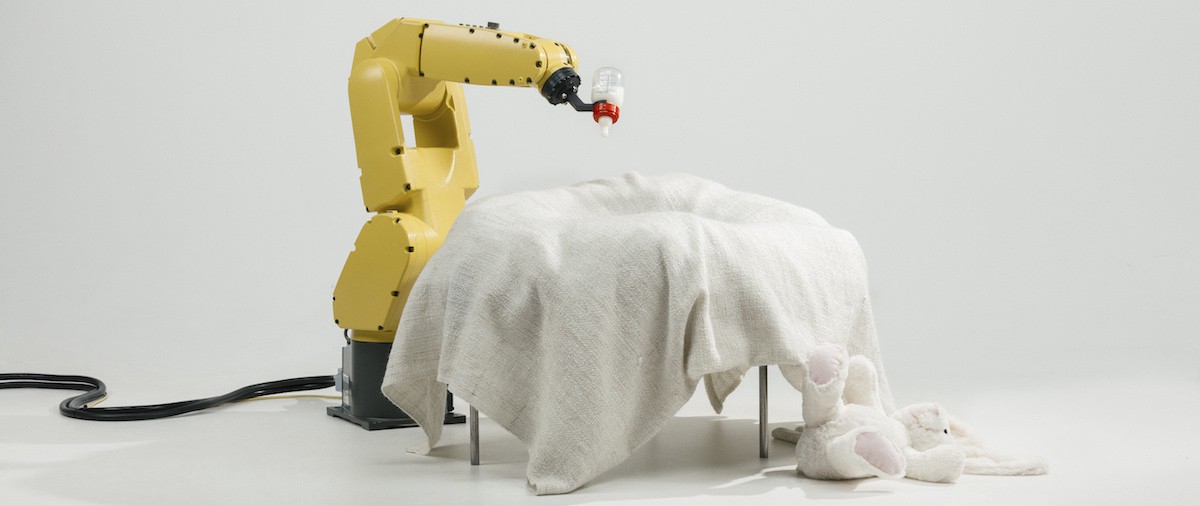

For the past few years I’ve been tracking a series of new devices meant to help parents and caregivers understand their unborn or newborn children, in a series I affectionately call Baby Futures.
It all began when I stumbled across the PreVue belt in 2011, a mildly horrific device designed for pregnant women that shows an ultrasonic preview of their unborn child–essentially a prenatal live stream that allows for the non-pregnant partner to bond with the baby in the days leading up to delivery. Sadly, or perhaps fortunately, the PreVue belt never quite made it to market, but it did launch my ongoing fascination around the tech world’s obsession with the quantified baby.
There’s also the (now defunct) Bellabeat Shell, an acoustic sensor created by the team behind the LEAF fitness tracker which allowed you to record, monitor, and share your child’s heartbeat in the womb. If you’re sad you missed it, there’s a forthcoming pregnancy belt for life-logging in the womb that promises to offer mothers the same peace of mind. With 13 sensors that wrap around your belly, PregSense will continuously capture health and wellness data to reassure expectant parents that their fetus is still alive–and since it’s from the makers of Ritmo, a similar wearable felt that plays prenatal music with four-speaker surround sound, it’ll give you enough data to decide whether your baby prefers Bach or Sonic Youth.
After birth, you can kit out your newborn with the Mimo Baby by Intel, an internet-connected baby onesie that tracks your infant’s sleep, breathing, body position, and temperature so you can compare for irregularities or share the data with your family. “You can look at your smartphone and know that everything is OK,” said Carson Darling, founder of the company that makes the device.

I should tell you that I am not a parent, but I think I’d like to be one someday. It’s hard not to worry about what a future might look like should the ubiquitous collection of children’s health and social data become commonplace. It already is, in many ways–but add wearables, smart devices, and parental worry to the mix and we’ve got a whole different future to start making sense of.
As a society, we’re obsessed with the quantified self–with stacks of data tracking the ways we live, work, and rest. But what about the quantified baby? Does mounting and absurdly precise data really offer more valuable insight into the early life of your child, or does it just give you more to stress about? On top of the data we already store on social media sites like Instagram and Facebook, whose consequences we won’t see until today’s children become adults, baby wearables could open a whole new Pandora’s box of questions around privilege, ethics, and privacy.

So, here’s a scenario to think about. Just for fun, let’s say there is a future where it becomes totally normal, even expected, to collect and store data about everything from the minutia of a baby’s day (eat and sleep times, for example) to more significant milestones like when they learn to walk, or talk, or read specific words. Tracking a child’s precociousness (or lack thereof) might become a predictor of their success later in life. In addition to interviews with the parents and the correct home address, preschool admissions might start requiring the submission of a toddler’s developmental data–heck, maybe even universities will. Imagine sending a curated record with a combination of early childhood data as part of a college application. It isn’t far off from the way we submit university applications now, except in the future Oxford or Harvard might look as far back as your toddler years to decide if you’d make a good student or not.
And what if, as a parent, you don’t collect the baby data you’re hoping for? We’ve seen doping in sports, so what about doping in data? Whether it’s to show that your child learned to talk sooner than the national average, or to prove they were an active and healthy toddler, would you pay someone to put a shine on your child’s stats if it meant more advantages in their future?
Then there’s always the possibility that the data won’t reflect poorly on the child–but on you as a parent. No more sticking your kid in front of a television for hours at a time when you could be teaching them math. Not to mention the responsibility of collecting data consistently. If, at the age of 18, a young adult finds major irregularities in their data, might they blame their parents for how that bad data collection (or none at all) is impacting their adult future?
Clearly I’m reaching to extremes to prove a point here. But either way, we already face an obvious problem with data as it stands today: It’s not neutral; it has biases in the way we interpret and collect it. In the United Kingdom, there’s a proposal before Parliament that would task schools and nurseries with reporting children supposedly at risk of becoming radicalized under new Home Office counterterrorism measures. If the data were available, how far would we really be from an algorithm that computes possible risk based on a child’s data profile? And how much differently would that child be treated, on top of all the other biases that already exist?
ProPublica recently published a report investigating racial profiling in software used to predict future criminals, finding it disproportionately biased toward black people. Even more, evidence showed that these risk assessments are remarkably unreliable, with only 20 percent of the people predicted to commit violent crimes actually doing so. This kind of mechanized prediction bears striking resemblance to what’s portrayed in the 2002 film Minority Report, but it’s no longer a fictionalization of Hollywood–it’s used across America in sentencing every day. According to ProPublica, these computational risk assessments “inform decisions about who can be set free at every stage of the criminal justice system.” Are we willing to extend similar assessments to our children?
In a world full of baby tech, privacy would become equally central to bad or misrepresentative data. It’s quite hard for you to say yes to posting a picture on social media of you covered in cake at your third birthday party. This kind of consent is, in fact, already an issue: In The Guardian earlier this year, Nicola Kobie asked whether children could sue over Facebook pictures following a warning from French authorities that parents could be liable for up to £35,000 [nearly US$46,500 at the time of writing] and accrue jail time for publishing photos of their children on social media without permission. Figuring out what is “old enough” will remain a hotly contested question for years to come.
Have no fear, though. In response, designer Laura Cornet has created a uniquely and intentionally creepy way of addressing this with her “social toy” New Born Fame. A provocation rather than a product pitch, the toy allows children to take and publish their own pictures straight to social media by pulling one of the toys attached to a smartphone–you know, a bird for Twitter, a small camera for Instagram, and so on.

Ultimately, these scenarios remain in the realm of possible but not probable futures. To dial it back for a second, I definitely understand how some of these new technologies might seem like a lifeline to a new or struggling parent. With worries about things like sudden infant death syndrome, it’s easy to see why parents would look to tracking technology to calm their fears–even though it’s been shown that this reliance can lead to a false sense of security. David King, a clinical lecturer in pediatrics at the University of Sheffield, told TIME that cardiovascular and oxygen monitors such as Owlet–a sock worn by young babies–may only help if combined with knowledge of “observation techniques and infant cardiopulmonary resuscitation.” Parents have to understand that it’s not a medical device.
I sent my collection of baby tech to a friend and mother of two young children, Joeli Brearley, to get her opinion on the matter. Having founded a movement called Pregnant Then Screwed to fight discrimination of pregnant women and mothers in the workplace, she has a keen interest in any space that lessens the burden of motherhood. After taking a look, she said she tends to avoid things that “might make [her] seem like a paranoid lunatic,” so the Mimo Baby and baby cameras make her nervous. She preferred the concept of something like the Bellabeat, and in fact had invested in a Doppler fetal monitor during her first, higher-risk pregnancy. While she found listening to her unborn son’s heartbeat comforting, Brearley later found out it wasn’t actually his heart she was listening to: “It was the noise from the placenta,” she said. “It is really tricky to differentiate between the two if you don’t know what you are doing.”
I’m inclined to think that, for now, the kind of devices we use to collect personal data aren’t going to be useful in helping us better understand our children. They are, at best, just unreliable add-ons to calm our anxieties around uncertainty and failure as we parent our way into many versions of one very tech-saturated future.


How We Get To Next was a magazine that explored the future of science, technology, and culture from 2014 to 2019. This article is part of our Vital Signs section, on the future of human health. Click the logo to read more.
